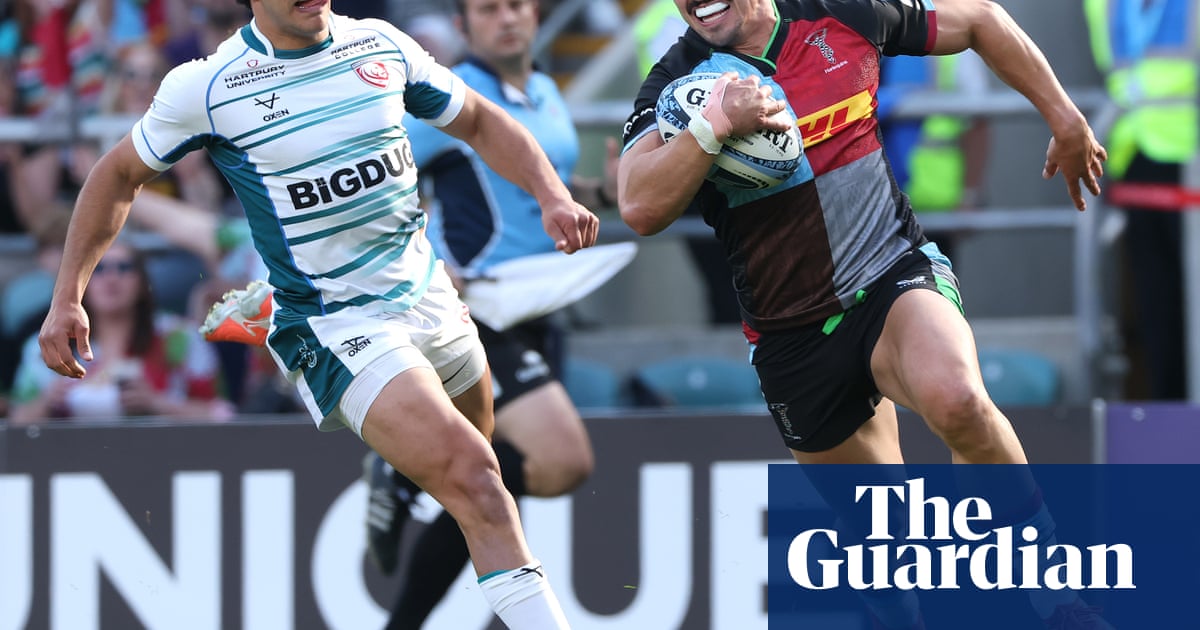They call it bouncebackability. And it works both ways.
Harlequins went down by 40 points in the last round at Welford Road, barely playing a shot. So it was inevitable they would burst into this one in front of a big house at the big stadium across the road for their now traditional “Big Summer Kick-Off”. Likewise,Gloucesterplayed the rugby of the gods last time out, one shy of 80 points against Exeter, so it stood to reason they would flop painfully here. And, boy, did they.
These vagaries should not happen to any professional outfit, of course, but the fact is they do, time and time again, particularly when the sides in question are, shall we say, of a flaky temperament. These two are nothing if not that.
All the same, the abject state of Gloucester’s defence exasperated, given what was at stake for them. Quins may have had their big game to get up for, but Gloucester started the match a mere three points off the top four. There is barely any margin for error now for those still in the running. Did no one tell them? This defeat now all but condemns the rest of their season, but for indulgence in the most forlorn of mathematical speculations.
“We need to win our last two for pride,” said George Skivington, Gloucester’s coach. “I’m just gutted. I’m embarrassed by today. We’ve blown a massive opportunity there.”
Quins’ season more or less ended with thatthrashing at Leicestera fortnight ago, but this was the erstwhile purveyors of all things attacking back to something like their better form. Not that they had to be that great, so accommodating were the visitors. Quins’ six tries were racked up with unseemly ease, their wings weighing in with a hat-trick, for Cadan Murley, and a brace, for Rodrigo Isgro. The admirable Will Evans, burrowing away at seemingly every tackle situation, also scored, at the back of a lineout-and-drive.
But that was the least of their deserts. Three other tries were chalked off in the first half alone, one of them when Tyrone Green dropped the ball as he went to touchdown behind the posts, having stepped his way through weak tackle after weak tackle.
In positive news for Lions fans, and coaches, Marcus Smith was back in the saddle and looking masterly, having limped off in some pain a fortnight ago. His inside ball was instrumental to Murley’s first try, to set Quins on their way in the ninth minute, and his tactical kicking was searching and imaginative. “He’s over the moon about the Lions,” said Danny Wilson, Quins’ coach. “What I’m really pleased about is, two days after he gets the news he puts in a performance like that. He wants to get the next level. He wants to prove he should be starting, should be a Test-match Lion, and that’s Marcus all over. I have all the faith in the world he’ll get there.”
Sign up toThe Breakdown
The latest rugby union news and analysis, plus all the week's action reviewed
after newsletter promotion
Opposite, Smith’s fellow Lions half-back Tomos Williams was quiet by his normal standards – but then those are abnormally vibrant. Christian Wade racked up his 91stPremiershiptry to bring Gloucester back to 21-7 with a few minutes of the first half remaining, but Murley’s second, sprung by Smith, left the Quins 28-7 up at the break.
Gloucester simply had to erupt into the second half, which they sort of did for a few minutes. Then Murley scored his hat-trick try, and that was that. Isgro burst on to Smith’s pass, straight from a scrum, and Green was on hand to put his mate over in the corner. A couple of yellow cards later, one for each of the No 8s, Alex Dombrandt and Ruan Ackermann, and Isgro went over for his second to end any hope for the visitors.
Gloucester’s two tries in the final quarter, by Santiago Carreras and the youngster Jack Cotgreave, lent them some consolation, but the lack of even a bonus point leaves them those three points adrift in sixth. Not quite out of it maybe, but let’s just say they will need to bounce back – and then some.
